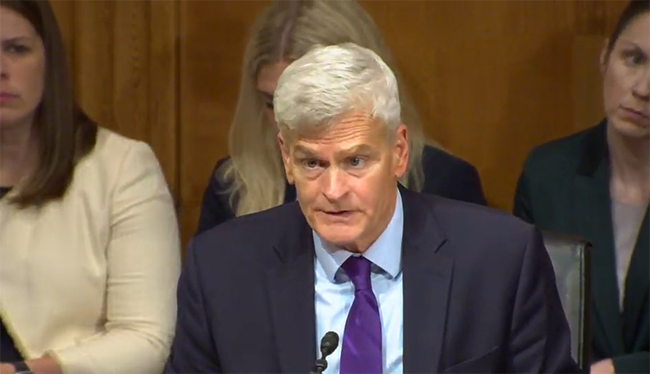Food and Drug Administration (FDA) inaction on patents for drug delivery devices has been troubling drug manufacturers for 20 years, and the situation is getting worse, says Sen. Bill Cassidy, MD (R-La).
Now the FDA is committing “an extraordinary abdication of authority,” allowing Federal Trade Commission (FTC) intervention that burdens the industry, Cassidy writes in a Sept. 30 letter to FDA Commissioner Robert Califf, M.D.
“For decades, FDA and industry have struggled with whether manufacturers must list patents for the device parts of drug-device combination products in the Orange Book,” says the letter from Sen. Cassidy, the Ranking Member of the Senate Health, Education, Labor, and Pensions Committee.
FDA’s “Approved Drug Products with Therapeutic Equivalence Evaluations,” known as the Orange Book, identifies FDA-approved drugs, as well as related patent and exclusivity information. Drug makers want clarity on how to handle those patents—particularly regarding devices for drug delivery, such as asthma inhalers and injection pens for insulin.
Stakeholders, including the Biotechnology Innovation Organization (BIO), have been advocating for patent clarity in the Orange Book since 2005. Sen. Cassidy highlights the burden of inaction on the industry and the complications it has caused.
“In the absence of FDA leadership, the Federal Trade Commission (FTC) has taken repeated actions that implement the Food, Drug, and Cosmetic Act (FDCA) in a way that FDA has never done or sought,” Sen. Cassidy writes. “FTC’s actions have sown confusion amongst manufacturers about how they should list patents for drug-device combinations, exacerbated by FDA’s inaction.”
‘Manufacturers must get this right’
When it comes to patents for a drug and the device used to deliver it, FDA policy is clear, according to Sen. Cassidy. “FDA generally defines a ‘drug’ as including the entire finished product—including both the chemical molecule and the delivery device,” he writes. However, manufacturers need to know “their listing obligations for device-related patents.”
“Manufacturers must get this right,” Cassidy explains. “List too many patents, and manufacturers could be accused of blocking competitors. List too few, and manufacturers may be accused of deceiving competitors and hindering them from accessing valuable incentives.”
Sen. Cassidy notes that the Federal Food, Drug, and Cosmetic Act (FDCA) obliges the FDA to grant exclusivity periods in the Orange Book and update listings monthly.
“Congress made clear across this statute that FDA is responsible for ensuring the Orange Book remains a critical resource for patients, manufacturers, and health care professionals and to facilitate the resolution of patent disputes,” he says.
Sen. Cassidy asks Commissioner Califf to respond by Oct. 25 to several questions about progress, the FDA’s approach, and the philosophy behind that approach. He specifically asks how the FDA views the Orange Book.
“On net, is it beneficial for patents related to the device constituent of drug-device combinations to be listed in the Orange Book? What are the pros of listing such patents, and what are the cons?”
Perhaps the answer to questions like that will provide some of the clarity the industry is seeking. Read the letter here.
BIO’s involvement
After decades of no progress on the issue at the FDA, BIO has found it also needs to advocate with the FTC.
A year ago, the FTC challenged more than 100 patent listings registered in the FDA’s Orange Book. BIO reacted with written comments to the Commission.
The FTC’s decision to start regulating in the FDA’s space, and threaten possible legal action, is neither needed nor helpful, BIO argues.
“Before thinking about enforcement, we recommend that the Commission give the FDA an opportunity to conduct its work and provide greater clarity for stakeholders. BIO’s members take seriously their obligation to file patents in the Orange Book in a correct and timely manner,” according to BIO’s comments, written by Hans Sauer, BIO VP for Intellectual Property. “Premature threats of enforcement action on that basis would raise serious uncertainty and due process concerns.”
Sauer calls for constructive action that can support industry.
“What is needed at this point is not the threat of enforcement or legal liability, but rather, increased regulatory clarity and a forum for stakeholders and regulators to jointly and proactively address new patent listing questions that are likely to arise with further technological advances,” Sauer says in his comments to FTC.
Pictured above: Sen. Bill Cassidy, MD (R-La) at a recent Senate Health, Education, Labor, and Pensions Committee hearing.




